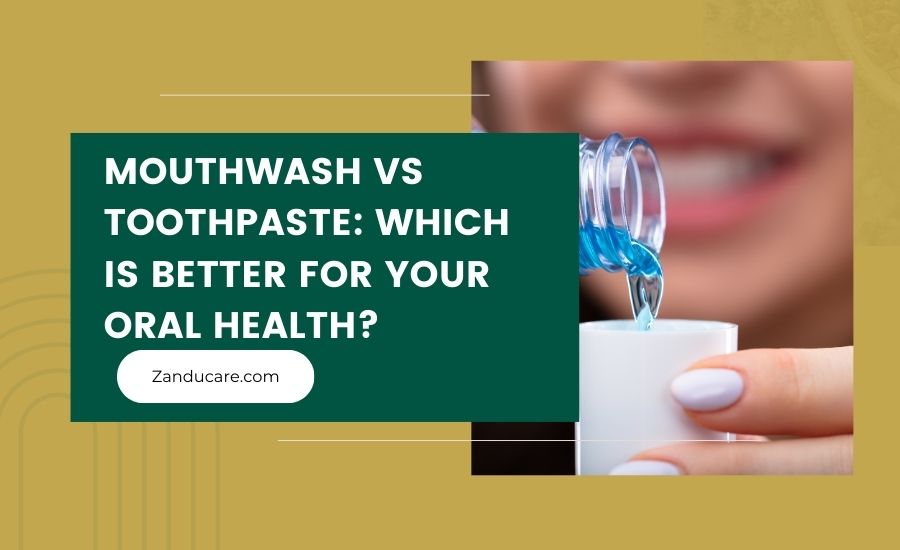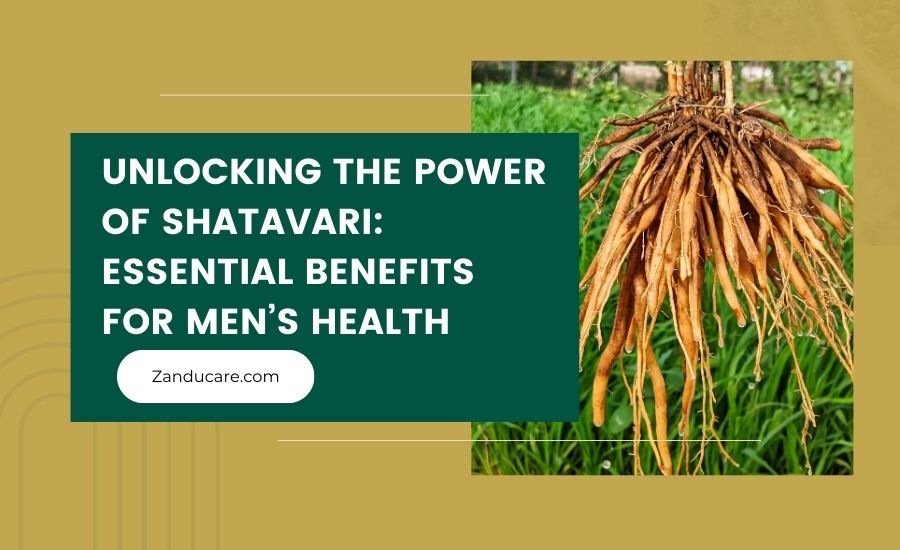
Mouthwash vs Toothpaste: Which is Better for Your Oral Health?
|
Key Insights:
|
Maintaining good oral health goes beyond just brushing your teeth. Both mouthwash and toothpaste play important roles in keeping our mouths clean, but which one is actually better? While toothpaste is essential for removing plaque and food particles, mouthwash can freshen breath and reach areas brushing might miss.
Understanding the differences and benefits of each can help you create an effective oral care routine that supports a healthy smile. Let’s explore the difference between mouthwash vs toothpaste.
|
Did you know:
|
What is a Mouthwash and a Toothpaste?

Mouthwash and toothpaste are essential products in our daily oral care routines, each serving a unique purpose. Toothpaste is a paste or gel used with a toothbrush to clean the teeth, remove plaque, prevent tooth decay, and freshen breath. It contains fluoride, which strengthens tooth enamel, and abrasives that help scrub away food particles and stains from teeth. Toothpaste is essential for daily brushing to keep your teeth and gums healthy.
Mouthwash, on the other hand, is a liquid solution used to rinse the mouth. It helps freshen breath, kill bacteria, and can reach areas that brushing might miss. While it doesn’t remove plaque like toothpaste, mouthwash with fluoride can provide extra protection against cavities. Toothpaste and mouthwash create a more complete oral hygiene routine for a fresher, healthier mouth.
Difference Between Mouthwash and Toothpaste
|
Aspect |
Mouthwash |
Toothpaste |
|
Purpose |
Toothpaste’s primary role is to clean teeth, remove plaque, and prevent tooth decay. |
Mouthwash, however, is mainly used to freshen breath, kill bacteria, and reach areas that brushing might not cover. |
|
Ingredients |
Toothpaste contains fluoride, abrasives, and sometimes whitening agents to strengthen enamel and polish teeth. |
Mouthwash typically includes antibacterial agents, flavours for freshening breath, and sometimes fluoride for added cavity protection. |
|
Application |
The toothpaste needs to be brushed directly onto the teeth. |
Mouthwash is swished around the mouth for about 30 seconds and then spit out. |
|
Effectiveness |
Toothpaste is essential for daily cleaning and plaque removal. |
Mouthwash provides a quick, additional layer of freshness and bacterial control but cannot physically remove plaque like brushing can. |
|
Role in Routine |
Toothpaste is a must for brushing. |
Mouthwash is optional yet beneficial as an extra step for those seeking fresher breath and added protection. |
Health Benefits of Mouthwash and Toothpaste
Here are the benefits of Mouthwash and Toothpaste:
Mouthwash
Below are some of the advantages of mouthwash:
1. Reduces Dental Plaque

Dental plaque is a sticky film of bacteria that forms on your teeth and gums throughout the day. When not removed, it can harden into tartar, leading to cavities and gum disease. Mouthwashes with antimicrobial agents, like chlorhexidine or essential oils, break down and reduce this bacterial film.
This process helps maintain a cleaner oral environment and makes it harder for plaque to accumulate. Regular use of an antiplaque mouthwash reduces the risk of long-term plaque buildup, complementing brushing and flossing efforts.
2. Prevents Gum Diseases
Gum diseases such as gingivitis (early gum inflammation) and periodontitis (more severe gum infection) result from bacterial buildup around the gums. Mouthwash works to control the bacteria that lead to these conditions, mainly when used alongside regular brushing and flossing. Certain mouthwashes have anti-inflammatory properties that soothe the gums, reducing redness and swelling.
Over time, this prevents gum disease and enhances overall gum health. For people with mild to moderate gingivitis, a targeted mouthwash can reduce symptoms and slow the progression to more serious gum disease.
3. Freshens Breath
Bad breath, or halitosis, is commonly caused by bacteria in the mouth that release sulfur compounds, resulting in an unpleasant odour. Mouthwash combats this by killing odour-causing bacteria and adding a layer of freshness to your breath. It’s beneficial after meals or on the go when brushing is impossible.
Mouthwashes with ingredients like cetylpyridinium chloride or essential oils provide a fresh, clean feeling and can mask odour effectively, leaving your mouth with a minty or refreshing taste. For those with chronic halitosis, a mouthwash may help manage the condition with consistent use.
4. Aids in Post-Surgical Healing
The mouth is vulnerable to infection after dental procedures such as extractions or gum surgery. Specialised mouthwashes help maintain a clean oral environment, minimising bacterial presence in sensitive areas and promoting faster recovery.
Antiseptic mouthwashes, often containing chlorhexidine, reduce infection risks by keeping bacteria at bay, and some have soothing agents to alleviate discomfort. By reducing inflammation and protecting wounds from bacterial invasion, these mouthwashes allow the tissues to heal faster, lowering complications in the critical healing period post-surgery.
5. Reduces Risk of Dry Socket
A dry socket is a painful complication that can arise after a tooth extraction, particularly if the blood clot dislodges from the extraction site. Mouthwash with antiseptic properties, such as chlorhexidine, can be used before and after surgery to reduce bacteria around the area and lessen the risk of this condition.
By keeping the area clean and free of excess bacteria, mouthwash helps stabilise the site, aiding in the formation and protection of the healing blood clot. Reducing the risk of dry socket with mouthwash can make the recovery process smoother and more comfortable.
6. May Help with Tooth Whitening

Some mouthwashes contain hydrogen peroxide or other whitening agents that can gradually remove surface stains from teeth, providing a brighter smile over time. Unlike toothpaste, mouthwash can reach all parts of the mouth, offering an even distribution of whitening effects. Although not as powerful as professional whitening treatments, these mouthwashes help maintain tooth colour by preventing the buildup of new stains from food, drinks, or smoking.
Using a whitening mouthwash regularly can be an excellent way to keep your smile looking bright in between dental visits or professional treatments.
7. Acts as an Oral Antiseptic
During the COVID-19 pandemic, the antiseptic properties of certain mouthwashes gained attention for their potential to reduce viral loads in the mouth, possibly reducing the spread of respiratory infections. Mouthwashes containing povidone-iodine or hydrogen peroxide were studied for their antiviral effects, suggesting they could offer additional protection by lowering the number of pathogens in the oral cavity.
While mouthwash alone isn’t a substitute for handwashing or mask-wearing, it provides an added layer of hygiene. The antiviral benefits of antiseptic mouthwash highlight its utility not just for dental health but also as a general tool for oral cleanliness in broader health contexts.
Toothpaste
Here are the most promising advantages of toothpaste:
1. Reduces Plaque Buildup
Toothpaste effectively removes plaque, a sticky bacterial film that accumulates on teeth and can lead to cavities and gum diseases if not properly managed. Ingredients like sodium lauryl sulfate (SLS) in many toothpastes act as surfactants, helping to dislodge and remove food particles and plaque from tooth surfaces, keeping teeth clean and preventing harmful buildup.
2. Supports Immune Response
Enzyme-based toothpaste are designed to stimulate the body's natural defence mechanisms, enhancing the immune response in the mouth. Enzymes like glucose oxidase work with saliva to produce antibacterial compounds, reducing harmful bacteria and promoting a balanced oral microbiome.
This strengthens the mouth's immune defences and helps prevent infections like gingivitis and periodontitis.
3. Prevents Cavities and Tooth Decay
Fluoride, commonly added to toothpaste, is highly effective in preventing cavities by strengthening tooth enamel and making it more resistant to decay. Regular fluoride toothpaste has been shown to significantly reduce the incidence of tooth decay by remineralising enamel and creating a barrier against acid attacks from food and bacteria.
4. Reduces Gum Inflammation

Ingredients in toothpaste, such as triclosan or certain enzymes, help reduce inflammation in the gums. If left unchecked, this condition can lead to gingivitis and other gum diseases. By controlling bacterial growth around the gumline, toothpaste reduces inflammation, bleeding, and swelling, maintaining healthier gums over time.
5. Controls Bad Breath
Toothpaste helps to eliminate odour-causing bacteria, keeping the mouth fresh. While mouthwash is often preferred for immediate freshness, toothpaste addresses the root cause of bad breath by removing debris, food particles, and bacteria from the teeth and tongue. This results in longer-lasting freshness.
6. Supports Post-Surgical Healing
Toothpaste containing mild antibacterial agents can support healing after dental procedures by keeping the area free from harmful bacteria. This added layer of hygiene aids in faster recovery and lowers the risk of infection post-surgery, providing extra care during sensitive healing periods.
7. Promotes Tooth Whitening
Some toothpastes include whitening agents like hydrogen peroxide, which help to remove surface stains and brighten teeth. This gentle whitening effect enhances the natural appearance of teeth over time, offering a cosmetic benefit in addition to oral health.
Also, do check our indepth guide where we have mentioned different types of Toothpaste.
Side-Effects of Mouthwash and Toothpaste
Mouthwash:
- Alcohol-containing mouthwashes can cause dry mouth, resulting in bad breath and an increased risk of cavities. The alcohol can also irritate sensitive tissues.
- Antiseptic mouthwashes containing chlorhexidine or cetylpyridinium chloride can temporarily stain teeth brown and irritate taste buds, causing altered taste perception.
- Overusing antibacterial mouthwashes may kill harmless bacteria and disrupt the natural microbial balance in the mouth, leading to oral thrush or other fungal infections.
- Certain ingredients, such as menthol, eucalyptol, and thymol, may trigger asthma attacks or mucus membrane irritation in some people.
Toothpaste
- Whitening toothpaste containing silica or hydrogen peroxide can sometimes cause tooth sensitivity or gum irritation, especially with overuse.
- Toothpaste containing sodium lauryl sulfate (SLS) may cause recurrent mouth ulcers, canker sores, or sloughing of oral mucosa in sensitive individuals.
- Fluoride toothpaste is generally recognised as safe, but swallowing too much fluoride while brushing can cause nausea, vomiting, and diarrhoea. This is especially concerning for young children.
- Some people experience contact dermatitis from menthol, flavourings, or other ingredients in toothpaste. This causes redness, rashes or swelling of the skin around the mouth.
Conclusion
Both mouthwash and toothpaste serve vital roles in a complete oral care routine. While toothpaste is essential for cleaning plaque from teeth, mouthwash offers extra protection by reducing bacteria and freshening breath. They provide better overall defence against plaque buildup, gum disease, cavities, and halitosis. An effective regimen combines daily brushing with occasional mouthwash for optimal dental and gum health.
You can check our related guides:
FAQs
1. Is mouthwash or toothpaste more important?
Toothpaste is more important than mouthwash for removing plaque and debris from teeth. However, mouthwash provides added antibacterial and breath-freshening benefits.
2. Should you use mouthwash before or after brushing?
It's best to use mouthwash after brushing. This allows the toothpaste first to clean the teeth physically. The mouthwash can then access more areas and provide antibacterial properties without debris.
3. Can you use mouthwash instead of brushing?
No, mouthwash should not replace regular brushing. While mouthwash has benefits, it cannot physically remove plaque in the way brushing does. You need to brush twice daily for thorough cleaning.
4. What is the best time to use mouthwash?
The most effective time is after your regular brushing routine, morning and night. You can also use mouthwash after eating to freshen your breath. Avoid rinsing directly after brushing, as it can wash away protective fluoride.
5. How often should you use mouthwash?
Most dentists suggest using an antibacterial mouthwash once or twice daily after brushing. The frequency of other mouthwashes depends on their purpose. Whitening rinses may only be needed 1-2 times per week.
6. What type of mouthwash is most effective?
Mouthwashes with cetylpyridinium chloride, essential oils, or chlorhexidine offer the strongest antibacterial activity and plaque reduction based on evidence. Fluoride mouthwashes also help prevent cavities.
7. Are there any risks to using mouthwash?
When used correctly, mouthwash is generally safe. Potential side effects include teeth discolouration, taste changes, tooth sensitivity, and gums or oral mucosa irritation. Limit use to the recommended dosage and consult your dentist if any reactions occur.
References:
- Mouthwashes with antimicrobial agents, like chlorhexidine or essential oils, break down and reduce this bacterial film.(https://pmc.ncbi.nlm.nih.gov/)
- Unlike toothpaste, mouthwash can reach all parts of the mouth, offering an even distribution of whitening effects. (https://pmc.ncbi.nlm.nih.gov/)
- Ingredients like sodium lauryl sulfate (SLS) in many toothpastes act as surfactants, helping to dislodge and remove food particles and plaque from tooth surfaces, keeping teeth clean and preventing harmful buildup.(https://pmc.ncbi.nlm.nih.gov)
- If left unchecked, this condition can lead to gingivitis and other gum diseases.(https://pmc.ncbi.nlm.nih.gov)





